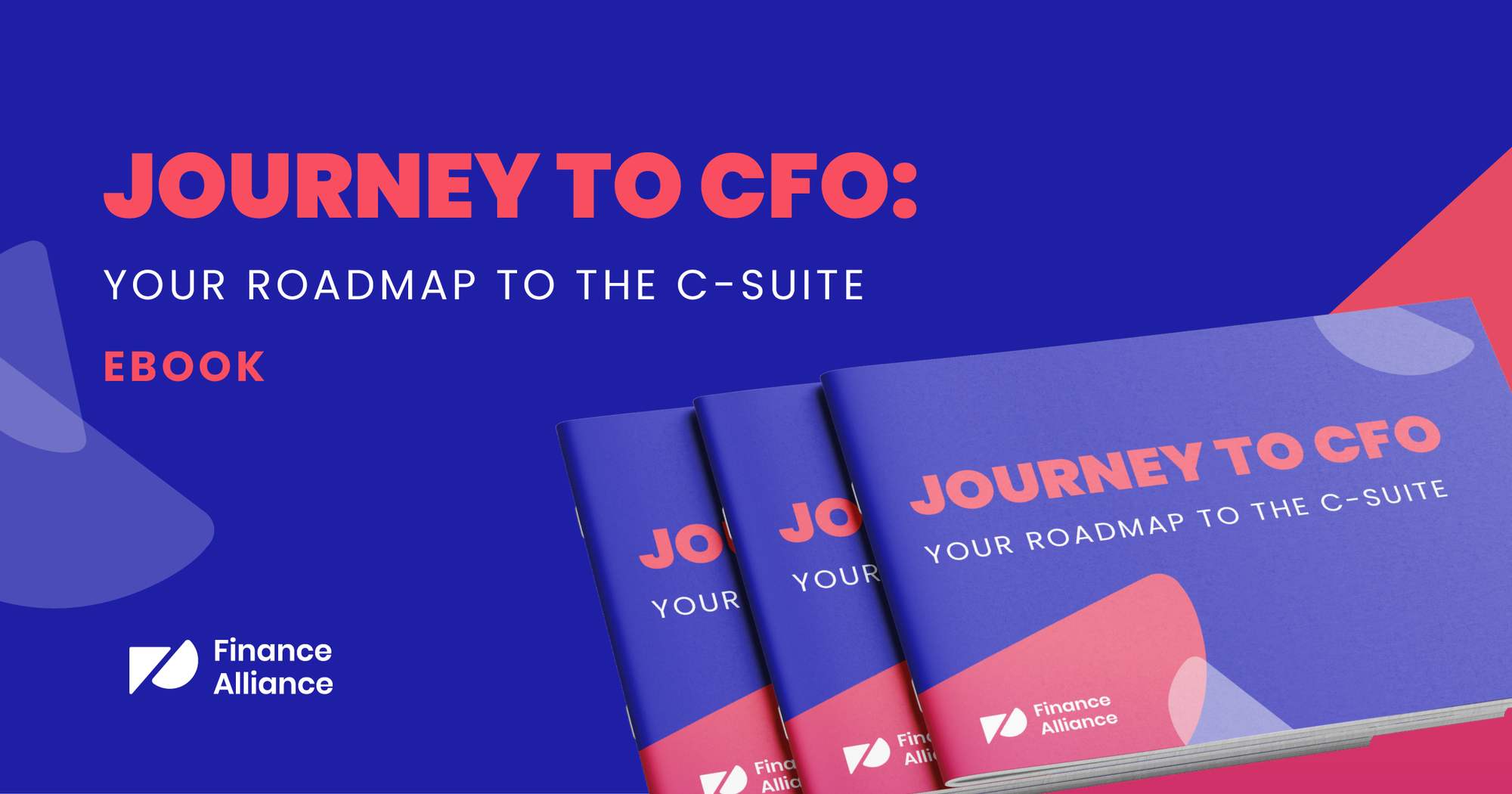Wouldn’t it be great if you could work with clients around the world, unburdened by location, traditional office hours, or geographical limitations?
Well, for today's CFOs, this isn’t merely a pipe dream, but a tangible reality as many have and are in the process of transitioning into the role of a virtual Chief Financial Officer. No longer bound to a specific location or organization, virtual CFOs are providing crucial financial leadership on a remote, freelance basis.
But how do you become a virtual CFO? What does the process involve, and what steps should you take to make the change?
Keep reading as we reveal why the virtual CFO path is becoming so popular for modern finance leaders, and the steps to help you make this career pivot confidently and effectively.
Table of Contents:
What is a Virtual CFO?
Imagine having the opportunity to use your financial expertise to guide businesses globally, from the comfort of your home or any remote location (sunny beach in the Caribbean, anyone?).
As a Virtual CFO or 'vCFO', you can do just that.
This role offers a unique blend of flexibility and challenge. It allows you to provide your strategic financial expertise on a part-time, remote basis. You become an instrumental part of your client's success story, helping them navigate financial decisions and strategies, and ensuring their fiscal health, all while embracing the benefits of modern technology and the digital workspace.
It's about taking your existing CFO skills and deploying them in a way that fits the new normal of work, offering both you and your clients the best of both worlds.

What’s the difference between CFO and virtual CFO?
Ah, the question everyone wants to know the answer to! Some of the main differences between traditional CFOs and virtual CFOs include:
1. 🏠 Where they work
A traditional CFO typically works in the office, as part of a 9-to-5 (or let's be honest, often longer) workday. Meanwhile, the virtual CFO is all about that flexible life, providing strategic guidance from any location, and often working outside the traditional office hours. So, as a vCFO, you can say goodbye to the dreaded commute! 🚗
2. 🤝🏽 How they're hired
Usually, a CFO is a full-time employee, complete with a long-term contract, benefits, and the whole shebang. On the other hand, businesses hire CFOs virtually on a part-time, flexible basis. They get to tap into top-tier financial expertise without the full-time commitment and cost. And you, as a virtual CFO, get the flexibility to work with multiple clients or juggle other commitments.
3. 💻 Who they work with
CFOs are often found in larger corporations that have the resources to afford their expertise. Virtual CFOs, though, are a boon for small to mid-size businesses that might not be ready for a full-time CFO but still need strategic financial leadership.
4. 🧠 Their focus
While both roles handle high-level financial strategy, the virtual CFO often wears more hats. You might handle some tasks usually assigned to controllers or accountants in larger organizations, like overseeing the nitty-gritty of financial operations. It's a broader role, so expect to flex a wider range of financial muscles!
So, while a virtual CFO shares the strategic acumen and leadership of a traditional CFO, the roles differ in flexibility, the scope of work, and their potential clients.
As a virtual CFO, you'd be at the forefront of a dynamic and evolving way of delivering financial expertise, offering the benefits of a CFO with the added advantage of adaptability to modern work environments.

What does a virtual CFO do?
If you're considering the leap to becoming a virtual CFO, it's important to understand the key responsibilities that come with this exciting role.
Although your tasks might slightly vary based on the specific needs of your clients, here's what you can typically expect:
1. Crafting financial strategies: As a Virtual CFO, you'll be guiding the financial strategy of businesses, steering them towards profitability and growth. Your expert advice will influence major business decisions, financial plans, and future strategies.
2. Running the numbers: From budgeting to forecasting, you're the one pulling the financial strings. You'll be expected to provide comprehensive financial planning and forecasting, identifying potential financial risks and opportunities. This includes periodic financial analysis to assess business performance and inform strategic planning.
3. Juggling cash flow: Money in, money out. You’ll make businesses don't trip over their financial shoelaces, keeping a close watch on liquidity.
4. Storytelling through reports: Budget reports, financial statements, you name it. You'll be spinning tales of triumph and warning, armed with numbers and insights that drive decision-making.
5. Keeping it legal: You'll need to ensure businesses stay compliant with financial regulations and implement effective tax planning strategies.
6. Tech maestro: As a virtual CFO, you'll work your magic on financial systems and processes, leveraging modern tech to bring efficiency to financial operations.
7. Conversing with stakeholders: Remember, you're the financial interpreter, translating complex financial data into language stakeholders can understand.
Being a virtual CFO is so much more than being a financial consultant. You're a strategic partner, an insightful analyst, a careful planner, and a communicator, all rolled into one.

The rise of the virtual CFO
Why are virtual CFOs becoming the talk of the town?
There are a few good reasons and, of course, some pretty cool trends to thank for that:
- Leveling up with tech: The rise in cutting-edge software gives businesses real-time insights into cash flow, making strategic decision-making a breeze.
- Playing the smart money game: Who said you need a massive bank balance to afford top-notch financial expertise? With virtual CFOs, even small and midsize businesses can now get the financial acumen they need without breaking the bank.
- Flexible financial leadership: Today, businesses can bring a virtual CFO on board on a part-time, flexible basis. It's financial leadership made-to-order, quite literally!
- Remote control: Working remotely has many benefits and according to research, those who work from home are 47% more productive than those who work in an office. Not only that but working remotely has never been easier. Thanks to video conferencing platforms like Zoom, businesses can stay connected with their CFOs virtually just as effectively as if they were in the same office. And let's be honest, who wouldn't prefer a Zoom call over a long commute?
- Lean & mean operations: In the wake of the pandemic, businesses are looking to streamline, focusing more on their core functions. And when you can get a seasoned CFO without the added costs of benefits, like paid holidays or medical leaves, it's a no-brainer!
- Moving beyond the basics: The accounting landscape is shifting, and services like tax preparation and compliance are fast becoming commodities. Businesses want more bang for their buck, which is exactly what a virtual CFO provides - strategic insight, financial analysis, and more.

How to become a virtual CFO
If you're intrigued by the virtual CFO path and want to take the leap, here’s how you can make it happen:
1. Identify your virtual CFO services
Start by mapping out what virtual CFO services you'll offer. These might include strategic financial planning, budgeting and forecasting, financial report preparation, cash flow management, risk management, and regulatory compliance. Make sure to leverage your unique skills and experiences to offer services that set you apart.
2. Set your price
When it comes to pricing, balance is key. You need to strike a fair price that reflects the value you provide, while also being attractive to your potential clients. Remember, you're not just selling your time, but your expertise, insights, and the value they'll bring to a business.
3. Build your tech infrastructure
In today's digital world, having a strong tech infrastructure is a must. You'll need reliable software for video conferencing, project management, financial reporting, and data analysis. Plus, since you'll be handling sensitive financial information, robust cybersecurity measures are a must.
4. Reach out to past and existing clients
Don't underestimate the power of your existing network. Offer your services to past clients who already know the value you provide, and consider upselling to existing ones by offering your new virtual CFO services. After all, who better to kickstart your solo career than those who already trust and value your work?
5. Network, network, network
Expand your client base by tapping into networking opportunities. This could be anything from attending industry events, joining online forums or groups, to leveraging LinkedIn to connect with potential clients. Remember, every conversation could be a door to a new opportunity.
6. Showcase your expertise
Finally, let the world know you're a virtual CFO ready to take on new clients. Consider starting a blog, posting on social media, or giving webinars to showcase your expertise and attract potential clients. Not only will you be marketing your services, but you'll also be building your personal brand as a thought leader in the field.
So, there you have it - your essential guide on how to become a virtual CFO. Embracing this career path isn't just about adopting new technologies or altering your work style, it's also about reinventing your professional persona and embracing the flexibility and dynamism of the modern business landscape. It's about leveraging the CFO skills you already possess while adapting to the digital era.
FAQs: Transitioning to a CFO virtual role
What is a CFO virtual role?
A Virtual CFO, or vCFO, offers the same high-level strategic financial expertise as a traditional CFO, but operates remotely, often on a part-time, flexible basis. They work with multiple clients, providing strategic financial leadership tailored to each organization's unique needs and circumstances.
What skills are essential for a virtual CFO?
In addition to the strategic financial acumen required of a traditional CFO, virtual CFOs need excellent remote communication skills, technological proficiency, and a high degree of adaptability. They should be comfortable with digital tools for collaboration, financial analysis, and cybersecurity.
How can a CFO transition to a virtual role?
Transitioning to a vCFO role involves identifying the services you'll offer, setting a fair price for your services, building a strong tech infrastructure, reaching out to past and existing clients, networking to attract new clients, and showcasing your expertise through content creation or webinars.
Download our Journey to CFO eBook!
Whether you're an aspiring finance professional or a seasoned veteran aiming for the top, this eBook is more than just a guide - it's your golden ticket to the C-suite.
You’ll not only learn about the critical skills to master for the role, but you’ll also hear from accomplished CFOs who share their wisdom, experiences, and personal anecdotes to help you achieve the same level of success.



 Follow us on LinkedIn
Follow us on LinkedIn




